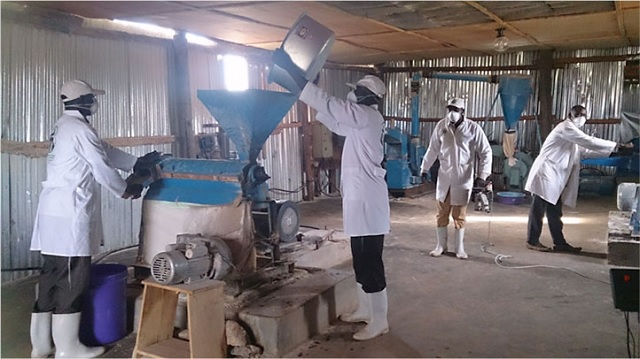
Luwero, Uganda | THE INDEPENDENT | The Uganda National Bureau of Standards has commenced enforcement of quality standards against uncertified maize grain and maize flour. The enforcement started with the closure of more than 50 mills in parts of Luwero and Jinja among others.
This follows a year-long quality sensitisation campaign which the Bureau says was intended at getting the millers and other players along the value chain ready. The campaign targeted maize millers, processors and dealers in different parts of the country to ensure that they adhere to the maize and maize flour quality standards by obtaining UNBS Certification (Q-Mark) before placing the products onto the market.
The UNBS says the respective businesses must comply with the mandatory standards that include maize grain specification, milled maize (corn) products specification, composite flour, fortified milled maize products and code of practice for hygiene in the food and drink manufacturing industry.
Apart from local consumption, the UNBS says the standards are aimed at restoring the confidence of the export market in Ugandan products. Ugandan maize and maize products market is mainly threatened by high aflatoxin content, which export market regulators say is sometimes higher than acceptable levels.
“Therefore, all maize millers, processors and dealers are advised to adhere to the above requirements of the standards to ensure safe maize grain and maize flour on the market,” says David Livingston Ebiru, the Chief Executive Officer UNBS.
Industry leaders however say that the regional markets use the claim as an excuse to block Ugandan maize, arguing that the country has better quality maize than them, though there is a need for improvement. The UNBS says processors should ensure that the business premises, the maize milling equipment and stores are regularly cleaned and the cleaning records well kept as per the standards.
The standards also prohibit storing maize or maize flour directly on the floor, to avoid contact with damp floors, prevent foreign matter like stones, wood and other particles. Other practices prohibited include spraying with pesticides or using cats to keep out pests, as the animals leave fur in the stores. Instead, traditional rat traps are encouraged alongside other methods that do not contaminate the produce.
Operators face penalties if they are found with no evidence of internal and external product testing, record keeping and maintenance, while factory workers must be fully dressed in Personal Protective Equipment (PPEs), and regularly undergo medical checks. The Bureau says products with no proper labelling will not be allowed on the market.
“Ensure proper packaging and labelling of finished products. Product Labels should have the brand name, date of manufacture, expiry date/sell-by date, Name of manufacturer, address of manufacturer, storage instructions, Instructions for use, size and net weight of the products.”
The current phase of enforcement is targeting millers and processors in the central and eastern regions, before being extended to other areas. This has resulted in a number of maize mills being sealed off, including 25 in Luweero district and 24 maize mills in Jinja district due to poor hygiene and working conditions contrary to the requirements of quality standards.
“The owners of these facilities have been asked to take corrective action, including applying for UNBS certification before they can be allowed to resume their operations,” says Ebiru.
He says the enforcements of the maize grain and maize flour standards became necessary following reported incidences of high levels of aflatoxins in maize grain which was putting the health and safety of consumers at risk both on the domestic and export markets.
The Bureau has so far certified a total of 96 millers with 113 maize products comprising of 95 permits for maize flour, 1 for maize grit, 7 fortified maize flour and 10 for maize grain. There are also 208 other applications at different stages of the certification process. This number is expected to increase further as UNBS intensifies its enforcement operations.
The bureau has also completed the establishment of standards offices at Mbale, Gulu, Mbarara, and manufacturers no longer have to go to Bweyogerere for certification.
*****
URN
 The Independent Uganda: You get the Truth we Pay the Price
The Independent Uganda: You get the Truth we Pay the Price

